Golang Function Template - The go standard library provides a set of packages to generate output. Use the `template.funcmap` type to wrap the function; Specific steps are as follows: You can first create a new, undefined template with template.new(), and besides the template.parsefiles() function, the. There are two type of function in go templates — builtin and user defined. The text/template package implements templates for generating text output,. Function call syntax for every function is following: Define the function body and write the function code; We can use the pipe (| ) operator to use predefined functions. Functions can be used inside templates as well.
The text/template package implements templates for generating text output,. Use the `template.funcmap` type to wrap the function; There are two type of function in go templates — builtin and user defined. Define the function body and write the function code; Function call syntax for every function is following: The go standard library provides a set of packages to generate output. We can use the pipe (| ) operator to use predefined functions. Specific steps are as follows: You can first create a new, undefined template with template.new(), and besides the template.parsefiles() function, the. Functions can be used inside templates as well.
There are two type of function in go templates — builtin and user defined. The text/template package implements templates for generating text output,. Function call syntax for every function is following: Define the function body and write the function code; Specific steps are as follows: Use the `template.funcmap` type to wrap the function; The go standard library provides a set of packages to generate output. We can use the pipe (| ) operator to use predefined functions. You can first create a new, undefined template with template.new(), and besides the template.parsefiles() function, the. Functions can be used inside templates as well.
Golang Template Openshift at Norma Warren blog
There are two type of function in go templates — builtin and user defined. The go standard library provides a set of packages to generate output. Use the `template.funcmap` type to wrap the function; The text/template package implements templates for generating text output,. Define the function body and write the function code;
Golang Cheat Sheet Varicolored Download Printable PDF Templateroller
The go standard library provides a set of packages to generate output. We can use the pipe (| ) operator to use predefined functions. Functions can be used inside templates as well. Function call syntax for every function is following: You can first create a new, undefined template with template.new(), and besides the template.parsefiles() function, the.
Golang Template Function
Specific steps are as follows: Functions can be used inside templates as well. Use the `template.funcmap` type to wrap the function; The go standard library provides a set of packages to generate output. Define the function body and write the function code;
Golang Template Function
Use the `template.funcmap` type to wrap the function; Define the function body and write the function code; There are two type of function in go templates — builtin and user defined. The text/template package implements templates for generating text output,. You can first create a new, undefined template with template.new(), and besides the template.parsefiles() function, the.
Golang Template Function
Functions can be used inside templates as well. Function call syntax for every function is following: The text/template package implements templates for generating text output,. The go standard library provides a set of packages to generate output. We can use the pipe (| ) operator to use predefined functions.
Golang Template Function
The go standard library provides a set of packages to generate output. The text/template package implements templates for generating text output,. There are two type of function in go templates — builtin and user defined. You can first create a new, undefined template with template.new(), and besides the template.parsefiles() function, the. Function call syntax for every function is following:
Golang Template Function
The text/template package implements templates for generating text output,. There are two type of function in go templates — builtin and user defined. Function call syntax for every function is following: The go standard library provides a set of packages to generate output. Use the `template.funcmap` type to wrap the function;
How To Work With Golang Template For Dynamic Text Output
Define the function body and write the function code; We can use the pipe (| ) operator to use predefined functions. Use the `template.funcmap` type to wrap the function; Specific steps are as follows: Functions can be used inside templates as well.
Golang Template Function
Function call syntax for every function is following: Specific steps are as follows: Use the `template.funcmap` type to wrap the function; We can use the pipe (| ) operator to use predefined functions. The text/template package implements templates for generating text output,.
Golang Template Function
The go standard library provides a set of packages to generate output. You can first create a new, undefined template with template.new(), and besides the template.parsefiles() function, the. The text/template package implements templates for generating text output,. We can use the pipe (| ) operator to use predefined functions. Specific steps are as follows:
Define The Function Body And Write The Function Code;
Use the `template.funcmap` type to wrap the function; Specific steps are as follows: The go standard library provides a set of packages to generate output. We can use the pipe (| ) operator to use predefined functions.
There Are Two Type Of Function In Go Templates — Builtin And User Defined.
Function call syntax for every function is following: The text/template package implements templates for generating text output,. Functions can be used inside templates as well. You can first create a new, undefined template with template.new(), and besides the template.parsefiles() function, the.








